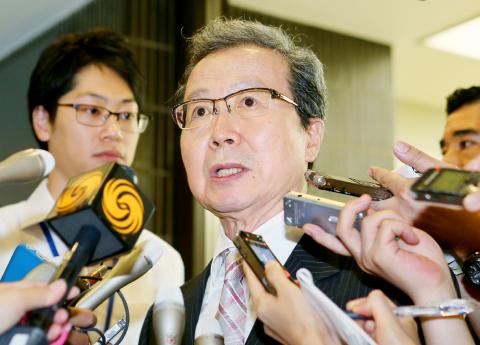Japan yesterday warned China that ties were “deteriorating markedly” over disputed East China Sea islets, and China’s envoy in Tokyo reiterated Beijing’s stance that the specks of land were its territory and called for talks to resolve the row.
Tensions between Asia’s two largest economies have risen since Japan saw an increasing number of Chinese coastguard and other government ships sailing near the disputed islets, known as the Diaoyutai Islands (釣魚台) in Taiwan, the Diaoyu Archipelago (釣魚群島) in China and the Senkakus in Japan, over the past few days.
Japanese Minister of Foreign Affairs Fumio Kishida called in Chinese Ambassador Cheng Yonghua (程永華) for the second time since Friday last week and told him that China was trying to change the “status quo” unilaterally, a ministry statement said.

Photo: AFP
It also said Kishida told Cheng that the environment surrounding Japan-China ties was deteriorating markedly.
Cheng said after the meeting that he told Kishida the islands were an integral part of China’s territory and that the dispute should be resolved through diplomacy and dialogue.
“I told him that ... it is natural that Chinese ships conduct activity in the waters in question,” he told reporters.
“I also told him both countries need to work on dialogue through diplomatic channels so as not to make things more complicated and escalated,” Cheng said.
Kishida summoned Cheng after the latest flare-up in tensions over dozens of Chinese vessels that sailed near the islands over the weekend.
Cheng had been called in by Japanese Vice Foreign Minister Shinsuke Sugiyama on Friday.
The flurry of Chinese incursions into the waters follows a period of sustained pressure on Beijing about its activities in the South China Sea, and Chinese criticism of what it saw as Japanese interference in that dispute.
The US, its Southeast Asian allies and Japan have questioned Chinese land reclamation on contested islands in the South China Sea, particularly since the Permanent Court of Arbitration in The Hague, Netherlands, last month rejected China’s historic claims to most of that sea.
China has refused to recognize the court ruling on a case brought by the Philippines.
Japan called on China to adhere to it, saying it was binding, but Beijing warned Japan not to interfere.

MAKING WAVES: China’s maritime militia could become a nontraditional threat in war, clogging up shipping lanes to prevent US or Japanese intervention, a report said About 1,900 Chinese ships flying flags of convenience and fishing vessels that participated in China’s military exercises around Taiwan last month and in January have been listed for monitoring, Coast Guard Administration (CGA) Deputy Director-General Hsieh Ching-chin (謝慶欽) said yesterday. Following amendments to the Commercial Port Act (商港法) and the Law of Ships (船舶法) last month, the CGA can designate possible berthing areas or deny ports of call for vessels suspected of loitering around areas where undersea cables can be accessed, Oceans Affairs Council Minister Kuan Bi-ling (管碧玲) said. The list of suspected ships, originally 300, had risen to about 1,900 as

Japan’s strategic alliance with the US would collapse if Tokyo were to turn away from a conflict in Taiwan, Japanese Prime Minister Sanae Takaichi said yesterday, but distanced herself from previous comments that suggested a possible military response in such an event. Takaichi expressed her latest views on a nationally broadcast TV program late on Monday, where an opposition party leader criticized her for igniting tensions with China with the earlier remarks. Ties between Japan and China have sunk to the worst level in years after Takaichi said in November that a hypothetical Chinese attack on Taiwan could bring about a Japanese

MORE RESPONSIBILITY: Draftees would be expected to fight alongside professional soldiers, likely requiring the transformation of some training brigades into combat units The armed forces are to start incorporating new conscripts into combined arms brigades this year to enhance combat readiness, the Executive Yuan’s latest policy report said. The new policy would affect Taiwanese men entering the military for their compulsory service, which was extended to one year under reforms by then-president Tsai Ing-wen (蔡英文) in 2022. The conscripts would be trained to operate machine guns, uncrewed aerial vehicles, anti-tank guided missile launchers and Stinger air defense systems, the report said, adding that the basic training would be lengthened to eight weeks. After basic training, conscripts would be sorted into infantry battalions that would take

DEEP-STRIKE CAPABILITY: The scenario simulated a PLA drill that turned into an assault on Taiwan’s critical infrastructure, with the launchers providing fire support Taiwan yesterday conducted this year’s first military exercises at Longsiang Base in Taichung, demonstrating the newly acquired High Mobility Artillery Rocket System’s (HIMARS) ability to provide fire support and deep-strike capabilities. The scenario simulated an attack on Penghu County, with HIMARS trucks immediately rolling into designated launch areas and firing barrages at the Wangan (望安) and Cimei (七美) islands, simulating the provision of fire support against invading forces. The HIMARS are supposed to “fire and leave,” which would significantly increase personnel and equipment survivability, a military official said. The drill simulated an exercise launched by the Chinese People’s Liberation Army (PLA) Eastern